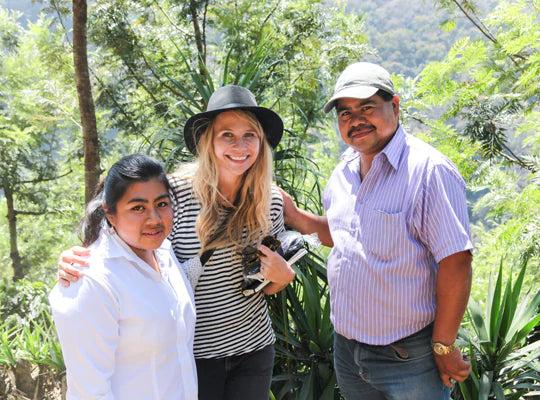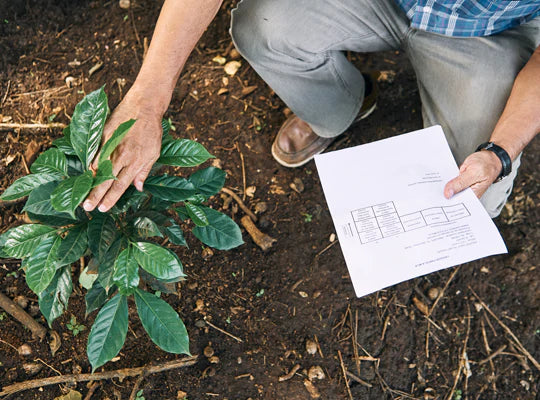Sustainable, Transparent and Ethical Sourcing

For over a decade, we have focused on building direct and long-term relationships with dedicated coffee producers who share our values and obsession with quality. The following principles inform our approach to sourcing coffee responsibly and ethically:
We build long-standing relationships
Our goal in every country we work in is to build longstanding, equitable, transparent and sustainable supply relationships. We invest a great deal of time and care into establishing and developing these relationships – whether that be with an exporter who connects us with talented producers, or directly with a single producer or a cooperative. Each party along our supply chain adds value to the product, and we are grateful to work with so many skilled and dedicated people.
Since we opened our doors in 2009, we have been lucky enough to work with many of the same coffee growers year after year. This includes people like Ricardo Zelaya, Rony Asensio, and Wicho Valdes in Guatemala, Sam and Epiphanie Muhirwa in Rwanda, the Rodriguez and Mamani families in Bolivia, and Silvio Leite and Fabiano Borre in Brazil. Each of these incredible producers has become like family to us, and we are proud to work with them and represent their incredible coffees in Australia. Our goal is to share their stories and celebrate their coffees – and, in doing so, to make them local household names. We know we’ve done our job when a customer actively seeks out a specific coffee by name, or celebrates its annual return to our shelves.
Showing up every year and representing the same coffees every year is important. We support our producing partners through the ups and downs of their annual harvest. This means they are able to continue to invest in their farms and improve quality, armed with the knowledge that we are committed to buying from them, and will give them a premium price for their output.
Meet our producing partners >We spend time with our producing partners
The success and longevity of our supply relationships requires a high level of openness, transparency and trust, and this is something we actively foster. Alongside our sister business, Melbourne Coffee Merchants, we visit our producing partners every year, to spend time on their farms, taste their coffees, select our favourites and, most importantly, to talk, see, listen, and learn. With every visit, we’re able to better understand the complexities and challenges that exist for each of the producing communities we engage with, thereby gaining an understanding of how we can best support them.
Transparency is integral to all that we do
Transparency is another core value that is integral to our business at every level. We are deeply committed to fostering transparent relationships with our producing partners across the supply chain. We work hard to ensure that the information exchange feeds in both directions, as we find this promotes better understanding and trust, and enables us to work collectively to support and grow together.
We believe that as an industry, this is something that we desperately need to work on, and it is for this reason that we are data donors and supporters of the Specialty Coffee Transaction Guide, an initiative run by Emory University that is designed to increase the amount of information available to coffee producers and buyers. The ultimate goal of this project is to dislodge the specialty coffee market from its almost exclusive reliance on commodity indices for negotiating prices and to create a new, more sustainable and stable frame of reference. Market Lane Coffee wholeheartedly supports the intentions of this project.
We pay sustainable prices
Unlike a lot of coffee buyers, the prices we pay producers for their coffee is in no way linked to the New York C commodity market. Instead, we pay the price dictated by the producer, which will usually be influenced by the cost of production, the quality of the coffee, and the volume of coffee we are purchasing. These prices are well above the amount paid for commercial coffee and the Fair Trade price for coffee, and they remain fairly stable year to year, or they increase.
Buying coffee in this way is much more sustainable for producers, as they are not exposed to the volatility of the commodity market, which can fluctuate and too often falls below the cost of production and/or to an unsustainable level.
Outside of pricing discussions, we also work with producers to understand their motivations and needs and to actively help them mitigate their risk. For some producers, pre-committing to our purchase volumes in advance helps them plan and get pre-harvest financing, and reduces their risk, especially with special preparation micro-lots. For others, growing the volume we buy from them is important. This may be because their capacity is growing, or because they want to sell more of the same grade of coffee at the premium prices we’re paying. In these situations, our efforts are focused on finding ways to grow with them.
We support coffee research
We are also active supporters of World Coffee Research. For every kilo of coffee we buy, we make a contribution to this not-for-profit organisation. World Coffee Research's mission is to grow, protect and enhance supplies of quality coffee, while improving the livelihoods of the families that produce it. It's the only global organisation taking a coordinated, collaborative and worldwide approach to scientific research into coffee. World Coffee Research relies on funding from the global industry, and we see it as vitally important to offer our support.
Learn more about World Coffee Research >We look for ways to positively contribute to the communities we buy coffee from
Beyond the transactional relationships we have with our coffee-producing partners, we are always seeking new and meaningful ways to meaningfully contribute to the communities associated with ethical coffee production.
Over the years our initiatives have included raising money for a women’s community room and dairy at Dukunde Kawa Cooperative in Rwanda, contributing to a kindergarten at Buf Coffee in Rwanda and, since 2011 supporting the Santa Clara Scholarship Fund in Guatemala.

